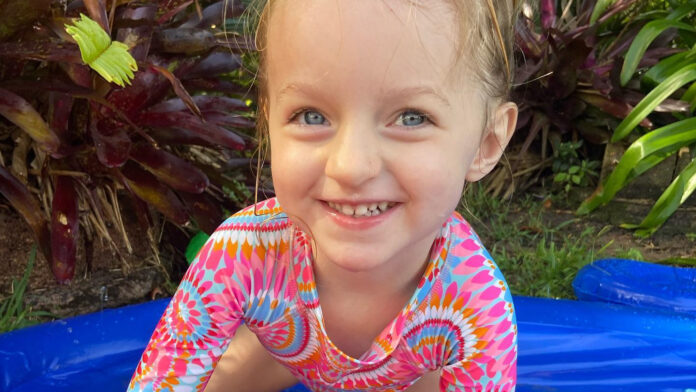It’s an image that takes the breath away and stays with you – the big, toothy grin, wide blue eyes and wet and straggly light-brown hair of the playful toddler in the backyard splash pool.
The Remembering Blair My Cause fundraising page captures Sunshine Coast youngster Blair Snelgar in a moment frozen in time.
Her beautiful smile has been described as “like a sunbeam that warms all hearts”.
Her angelic face paints a picture of life, love and happiness far removed from the struggles she and her family endured over the three precious years of her life.
Blair passed away in her sleep on April 29 and will be farewelled in a private ceremony on Wednesday, May 17.
The youngster was born with Angelman syndrome: a severe and extremely rare genetic condition that affects only one in 15,000 to 20,000 live births.
Angelman Syndrome Association of Australia national president Fiona Lawton started the My Cause fundraiser with an initial goal of $5000 towards Blair’s celebration of life and to support parents Emma and Ryan and big sister Saige, 4, in their loss.
It is hoped that proceeds also may go towards providing an ongoing legacy in Blair’s name regarding research and scientific endeavours to support other people with Angelman syndrome.
Late on Wednesday, the initiative had already raised more than $31,200.
SUBSCRIBE here now for our FREE news feed, direct to your inbox daily.
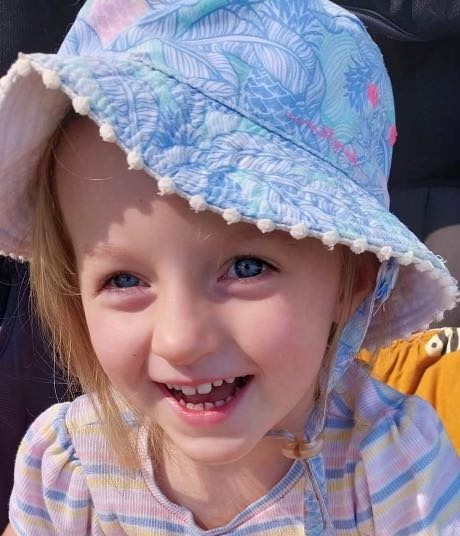
“There has been a huge outpouring, not just across Australia but across the world,” Brisbane-based Ms Lawton told Sunshine Coast News.
“I generally speak with or meet all new families who are diagnosed (with Angelman syndrome). We would have met much earlier but Blair was born on February 17, 2020, and got diagnosed during the COVID lockdowns.
“It’s fair to say it’s an incredibly difficult thing to be diagnosed with a rare condition and not have the opportunity to be surrounded by loved ones and family while you’re going through the trauma and grief of diagnosis. We were able to meet just before Blair turned one and we’ve become good friends, Emma and me.
“Emma was absolutely devoted to Blair, and she was fierce in terms of her drive and her passion to understand the Angelman syndrome condition and what she could do to help improve Blair’s quality of life and to manage the symptoms.”
The genetic disorder is present at birth and is a lifelong condition that causes developmental and neurological disabilities.
Treatments can help deal with the realities of delayed development, intellectual disability, speech and balance problems and seizures. But there is as yet no cure.
“It is a rare, neuro-genetic condition that affects all aspects of a person’s life,” Ms Lawton said of the disease named after Dr Harry Angelman, an English physician who published the first research paper describing children with the particular characteristics in 1965.
“People are differently impacted, depending on how it’s affected them neurologically. But in all cases, it’s a severe condition: non-verbal, 24/7 high-care needs, severe epilepsy.
“They are all vulnerable because of the complications of Angelman syndrome.
“In Australia right now on the NDIS (National Disability Insurance Scheme), there’s just over 500 people. It’s extremely rare.
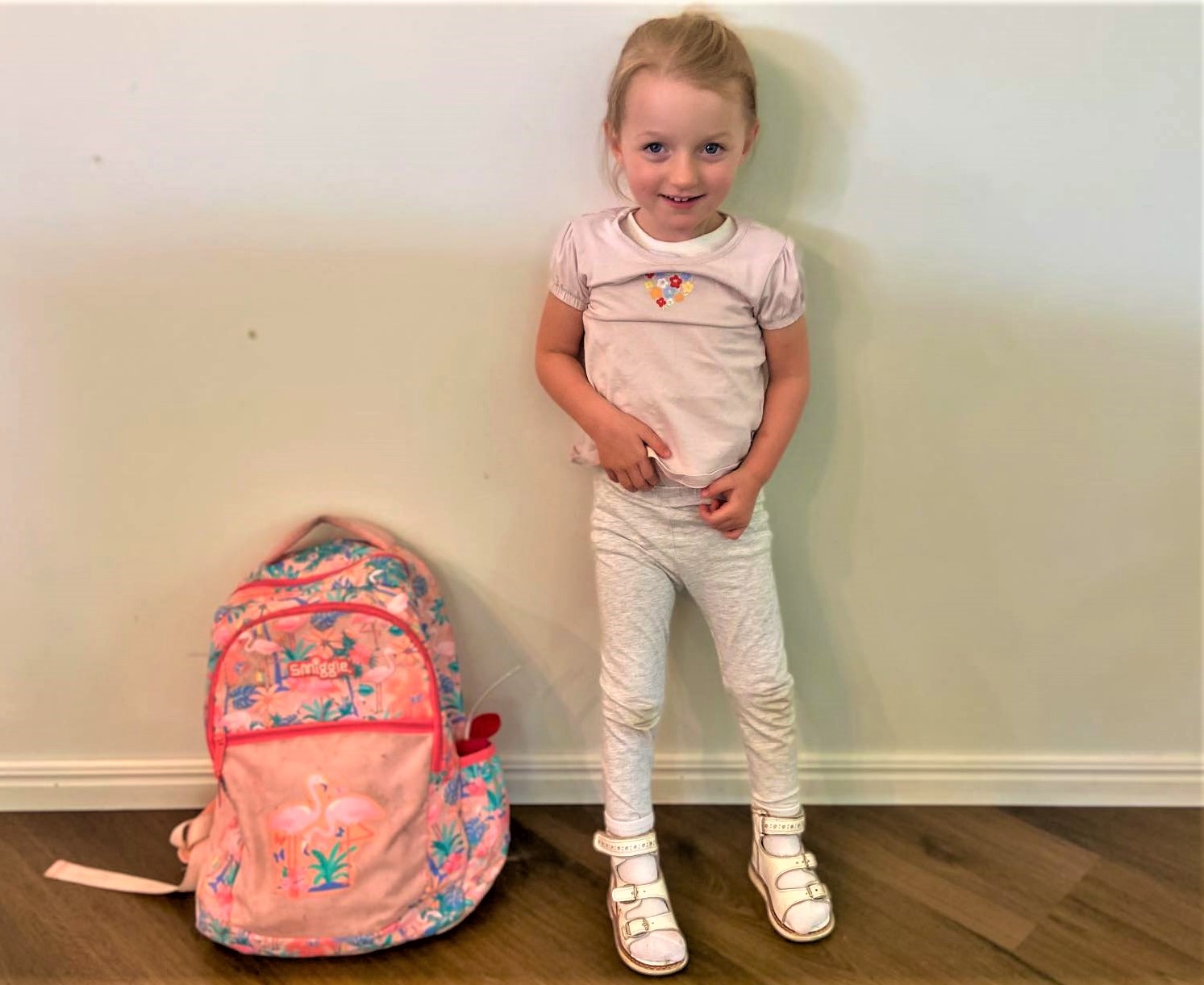
“In Blair’s case and in many cases, there are feeding issues. She needed to have a nasal-gastric tube on and off for the first two years of life, before progressing to a g-tube because of failure to thrive.
“Motor coordination disorder means some never walk, and some are wheelchair users their whole life.
“Blair could stand up and use a walking frame to get around, and she was working hard on her motor coordination. You might meet someone else who can already walk or you might meet someone who’s 33 who will never walk.
“Epilepsy is what really concerns families from a medical perspective.
“Then there’s a sleep disorder, which is exhausting because they just don’t sleep. They’re ‘bionic’.
“Blair had a sleep disorder as well, so needed around-the-clock care.
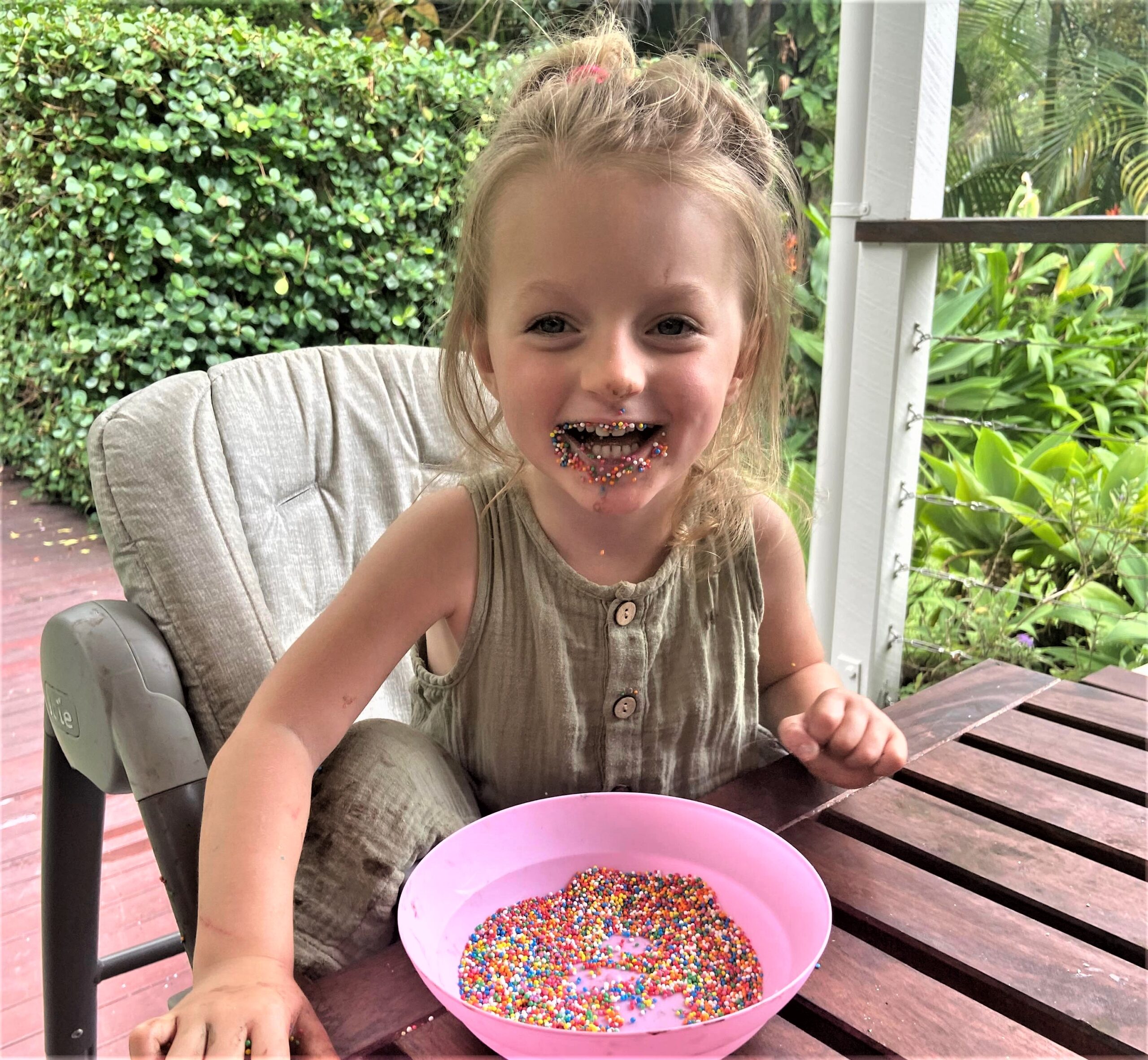
“People just can’t get into their heads (what you need to do as a family). You’re at medical appointments sometimes 60 times a year, therapy two times a week. You’re in and out of doctors and (dealing with) medications.
“It’s a full-time business.”
But Ms Lawton and families around the world hold on to hope for the future, especially following the first collaborative conference of the Angelman Syndrome Association Australia and Foundation for Angelman Syndrome Therapeutics Australia, held in Brisbane in February this year.
Help keep independent and fair Sunshine Coast news coming by subscribing to our FREE daily news feed. All it requires is your name and email at the bottom of this article.
More than 150 families, clinicians, researchers and supporters came together to share learning, therapies, practical and family support and the NDIS, and to celebrate small steps and successes at a gala ball.
Emma, Ryan, Blair and Emma’s mother Lisa were among the attendees.
“Researchers from around the world were there, talking about clinical trials and research,” Ms Lawton said.
“February 15 is International Angelman Day. Blair was born on February 17. Emma always found that to be such a statement that Blair was born in February.
“The family, having worked out how to manage sleep and seizures, were getting very active in their involvement in the community.
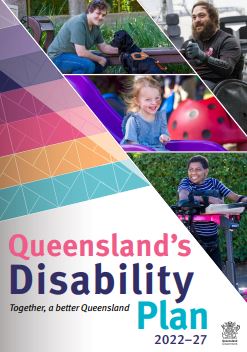 “Blair is actually on the front cover of the Queensland disability strategy. She is the face of the Queensland disability strategy.
“Blair is actually on the front cover of the Queensland disability strategy. She is the face of the Queensland disability strategy.
“That shows you how enormously proud Emma and Ryan are, and will continue to be, of Blair, and how passionately they want to increase awareness of Angelman syndrome and promote the full inclusion of people with disability in Queensland society.
“I’m going to get emotional now, but to struggle every single day and meet the world with that gorgeous smile every single day of her life…
“All she knew was love for three years, 24/7 – just receiving all the incredible love from everyone she knew but also giving it in bucket loads.
“For someone at the age of three to already be influencing the community to know better, to be better, so we can do better for people with disability, well, I think that is amazing.
“If we were all able to say that we left the world with the same legacy that Blair is leaving us, that would be incredible.”
In lieu of flowers at the ceremony, the family would like donations made to the Foundation for Angelman Syndrome Therapeutics Australia.
Local journalists supporting local people. Help keep independent and fair Sunshine Coast news coming by subscribing to our FREE daily news feed. All it requires is your name and email at the bottom of this article.


